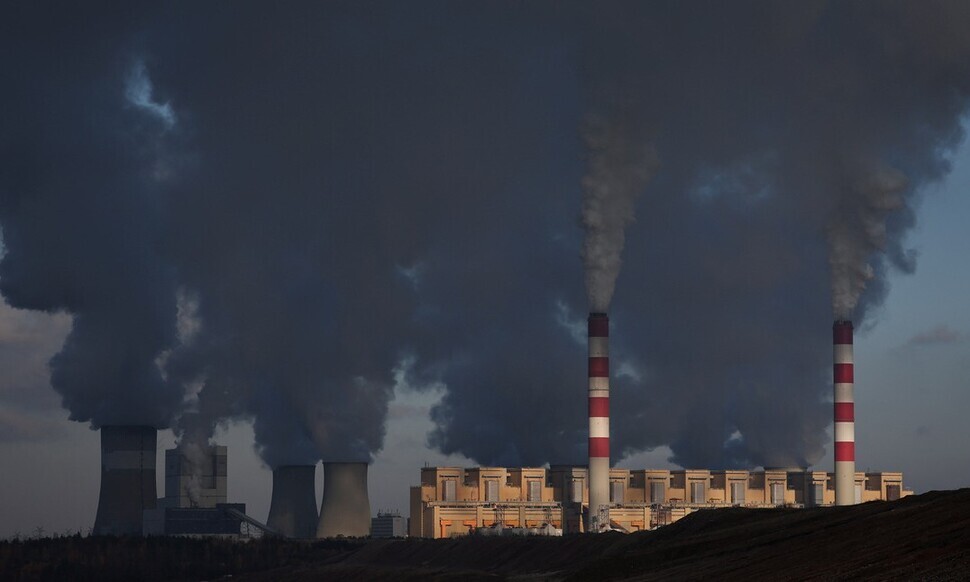hankyoreh
Links to other country sites 다른 나라 사이트 링크
At critical point in global warming, all eyes on what action will come out of COP28

Can action plans be developed for honoring the climate pledge in the 2015 Paris Agreement, in which the countries agreed to work to prevent Earth’s temperature from rising by over 1.5 degrees centigrade above pre-industrialization levels?
This is the question on the minds of 70,000 people, including representatives of 198 countries around the world and leaders of climate environment groups, as they gather for the 28th UN Climate Change Conference, known as COP28, in Dubai.
The Conference of the Parties (COP) is the top decision-making body for the UN Framework Convention on Climate Change, with heads of state and other representatives gathering to negotiate response measures to climate change.
COP28, which will run from Thursday until Dec. 12, is expected to be an occasion for reviewing the different countries’ progress toward honoring the Paris Agreement’s 1.5-degree limit and making some very important decisions, including discussions on the details of a “loss and damage fund” to help overcome the negative consequences of climate change faced by developing countries.
In the lead-up to COP28, the news coming in from around the world is grimmer than ever.
The Copernicus Climate Change Service, which is the European Union’s climate change oversight organization, announced on Nov. 20 that the global average temperature was recorded at levels 2.07 degrees and 2.06 degrees higher than pre-industrialization levels on Nov. 17 and 18.
While this phenomenon was a one-time observation over a two-day period, it marked a breach in the 2 degrees that humankind had decided on a red line for minimizing the impact of climate change.
On the same day, the UN Environment Programme published its 2023 “Emissions Gap Report,” which observed that rising global greenhouse gas emissions have resulted in warming exceeding the critical point for human control. The report estimated that even if all the different countries’ national determined contributions (NDCs) for greenhouse gas reduction are honored, there was still a 66% likelihood that the planet’s temperature would rise by 2.9 degrees by the end of the century.
Scientists warn that if temperatures rise by 3 degrees, polar ice melting could spiral out of control and the Amazonian rainforest could disappear due to drought. This means that unless the world comes up with extraordinary measures to avoid climate disaster, many regions of the world could become uninhabitable. This is why the world’s attention is focused on the meeting in Dubai.
The national delegations at COP28 are planning to conduct a first-ever “global stocktake” to review the progress of the different countries’ efforts to reach the goals in the Paris Agreement. Attention is focusing on whether the participating countries can agree on their own agenda for stepping up climate action on that basis, including the phasing out of fossil fuels and tripling of renewable energy infrastructure.
Also coming under discussion are the details for the operation of the so-called loss and damage fund, which was agreed upon at COP27 last year. While there is support for the view that current greenhouse gas emission reduction levels are woefully inadequate to reach the goals in the Paris Agreement, the advanced and developing economies have been at odds over whether “responsibility” for the climate crisis should be emphasized in the different issues.
Meanwhile, reports that the conference will not be attended by either Chinese President Xi Jinping or even US President Joe Biden — who has consistently emphasized the need to respond to climate change — have already raised questions over whether any sort of binding agreement can be reached.
“You can sense that responding to climate change has been shifted down the list of the different countries’ priorities due to the effects of things like the war between Russia and Ukraine and the war between Israel and Hamas,” observed Choi Dong-jin, the director of the Institute for Climate Change Action.
“But with civil society around the world and even the pope actively speaking out, it seems like we should be able to expect something,” he added.
By Ki Min-do, staff reporter
Please direct questions or comments to [english@hani.co.kr]

Editorial・opinion
![[Column] How opposing war became a far-right policy [Column] How opposing war became a far-right policy](https://flexible.img.hani.co.kr/flexible/normal/500/300/imgdb/original/2024/0702/5017199091002075.jpg) [Column] How opposing war became a far-right policy
[Column] How opposing war became a far-right policy![[Editorial] Korea needs to adjust diplomatic course in preparation for a Trump comeback [Editorial] Korea needs to adjust diplomatic course in preparation for a Trump comeback](https://flexible.img.hani.co.kr/flexible/normal/500/300/imgdb/original/2024/0702/9717199086060096.jpg) [Editorial] Korea needs to adjust diplomatic course in preparation for a Trump comeback
[Editorial] Korea needs to adjust diplomatic course in preparation for a Trump comeback- [Editorial] Silence won’t save Yoon
- [Column] The miscalculations that started the Korean War mustn’t be repeated
- [Correspondent’s column] China-Europe relations tested once more by EV war
- [Correspondent’s column] Who really created the new ‘axis of evil’?
- [Editorial] Exploiting foreign domestic workers won’t solve Korea’s birth rate problem
- [Column] Kim and Putin’s new world order
- [Editorial] Workplace hazards can be prevented — why weren’t they this time?
- [Editorial] Seoul failed to use diplomacy with Moscow — now it’s resorting to threats
Most viewed articles
- 110 days of torture: Korean mental patient’s restraints only removed after death
- 2Nine dead in Seoul after car plows into pedestrians
- 3[Editorial] Korea needs to adjust diplomatic course in preparation for a Trump comeback
- 4Korea to create dedicated population strategy ministry to combat low birth rate, aging society
- 5[Editorial] On the revival of Daehan News and theater boycott
- 6Samsung Electronics workers to go on first strike in company’s 55-year history
- 7Japan is building a military meant for more than self-defense — and has the US to thank for it
- 8[Column] How opposing war became a far-right policy
- 9Korean scientists publish research that could be used to development coronavirus treatment
- 10[Editorial] Silence won’t save Yoon